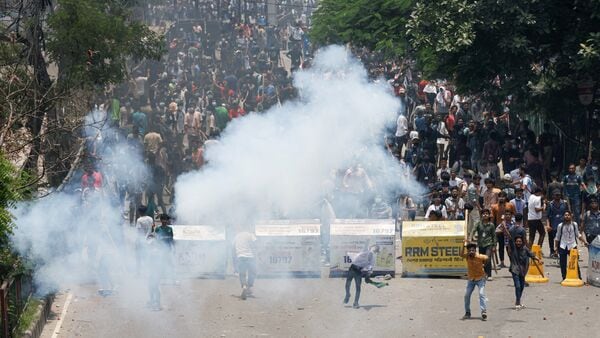Bangladesh has been experiencing significant turmoil recently. The country’s streets have been filled with protesters, initially rallying against government job quotas. However, the situation quickly evolved into a broader anti-government movement. The ruling Awami League, led by Prime Minister Sheikh Hasina, faces mounting pressure as opposition parties seize the opportunity to voice their long-standing grievances.
The protests in Bangladesh began peacefully but soon turned violent, resulting in numerous casualties. This escalation has further fueled public anger and widened the rift between the government and its critics. As a result, Bangladesh’s political stability is now under serious threat.
Opposition’s Role and International Influence
The Bangladesh Nationalist Party (BNP) and its ally, the Jamaat-e-Islami Bangladesh, have joined the protests, adding a political dimension to the unrest. These groups are now calling for Prime Minister Hasina’s resignation and fresh elections under a caretaker government. The United States has also played a role, expressing concern over the recent elections in Bangladesh and allegedly encouraging opposition to the current government.
Furthermore, the involvement of these opposition parties has transformed the nature of the protests. What started as a movement against job quotas has now become a platform for broader political demands. This shift has complicated the situation in Bangladesh, making it more challenging for the government to address the protesters’ concerns.
Impact on Bangladesh’s Stability
The ongoing protests have weakened the Awami League’s position and damaged Bangladesh’s economy and international standing. Prime Minister Hasina’s image has taken a hit, particularly due to the harsh crackdown on protesters. This situation could potentially strengthen the BNP and Jamaat-e-Islami, which have ties to radical Islamist groups.
The economic impact of the unrest in Bangladesh cannot be overstated. The country’s crucial garment industry has been disrupted, and foreign investors are growing wary. If this situation persists, it could undo years of economic progress that Bangladesh has achieved under the current government.
Consequences for Regional Security
The potential rise of Islamist forces in Bangladesh raises concerns for regional stability. There are fears that Pakistan’s influence might increase, potentially leading to more support for radical groups and even terror outfits. This could have spillover effects in neighboring countries, particularly India.
Bangladesh’s strategic location makes it a key player in South Asian geopolitics. Any shift in Bangladesh’s political landscape could have far-reaching consequences for the entire region. Therefore, the current unrest is not just a domestic issue for Bangladesh but a matter of regional concern.
Bangladesh’s Relationship with India
India has a vested interest in Bangladesh’s stability. The current unrest poses challenges for India, as a weakened Awami League government could open doors for groups less friendly to Indian interests. However, this situation also presents an opportunity for India to strengthen its support for Prime Minister Hasina’s government.
India and Bangladesh have enjoyed close ties under the Awami League government. A change in Bangladesh’s political leadership could potentially jeopardize this relationship. Therefore, India is likely to take a keen interest in helping Bangladesh navigate through its current crisis.
Steps Forward for Bangladesh
To address the current crisis, Bangladesh’s government may need to:
1. Take decisive action against radical Islamist groups
2. Reconsider its approach to balancing different political factions
3. Address the grievances that sparked the initial protests
4. Work on rebuilding trust with the public and international community
Additionally, Bangladesh needs to focus on strengthening its democratic institutions. This includes ensuring fair elections, protecting freedom of speech, and promoting a free press. These steps are crucial for long-term stability in Bangladesh.
India’s Role in Supporting Bangladesh
India can play a crucial role in helping Bangladesh navigate this challenging period. This may involve:
1. Providing diplomatic support to the Hasina government
2. Assisting in efforts to counter extremist influences
3. Helping Bangladesh strengthen its democratic institutions
4. Supporting economic initiatives to address public grievances
Moreover, India could help Bangladesh in improving its infrastructure and enhancing regional connectivity. This could not only boost Bangladesh’s economy but also strengthen ties between the two nations.
Conclusion
The current situation in Bangladesh presents both challenges and opportunities. While the unrest has weakened the government’s position, it also highlights the need for decisive action against extremist elements. Bangladesh’s stability is crucial for regional security.
ALSO READ: What’s the objection to writing own name on own shop?
